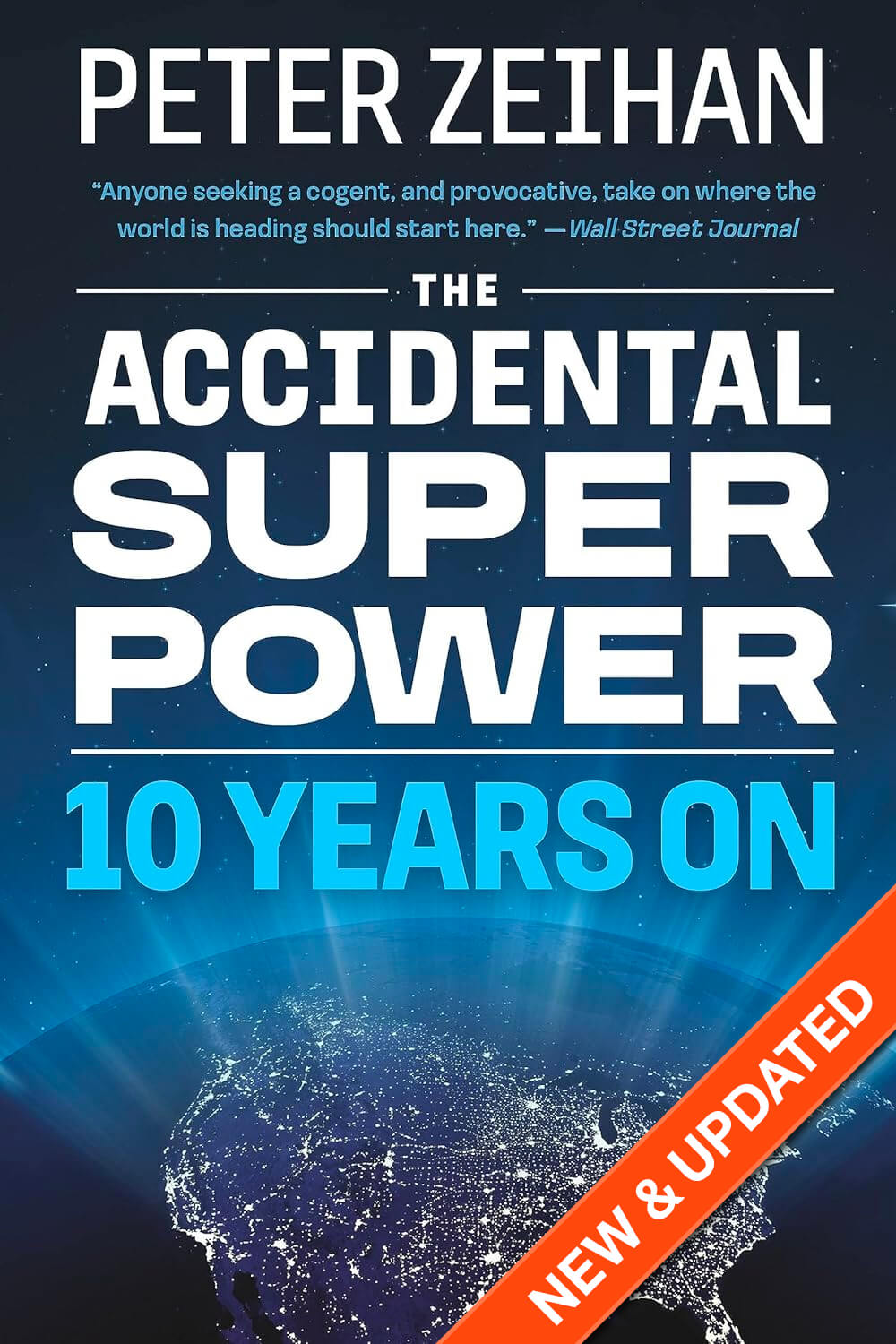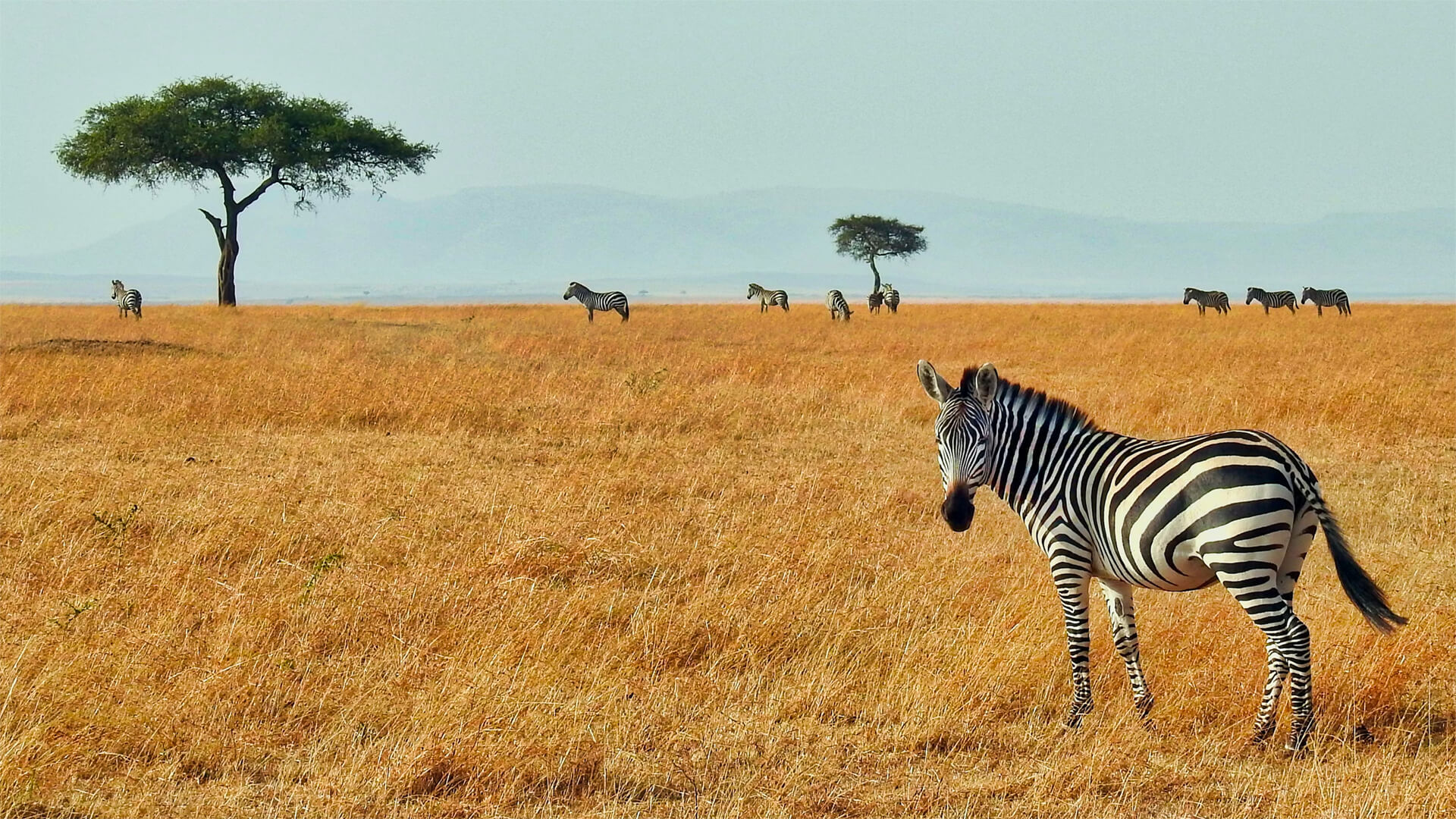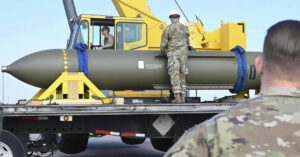FOR MORE ON THE FUTURE OF SUB-SAHARAN AFRICA, SEE DISUNITED NATIONS

The Accidental Superpower: Ten Years On
With a new “10 years later” epilogue for every chapter, comes an eye-opening assessment of American power and deglobalization in the bestselling tradition of The World is Flat and The Next 100 Years.
Next on the list in our ‘Post-American’ series is Sub-Saharan Africa. This region is filled with geographical challenges, slow growth and development, and several other obstacles, but a handful of countries will be alright.
Many of the countries in this region are a few decades behind the rest of the world, meaning their exposure to globalization is fairly limited. As the US steps back, these countries will experience less catastrophic fallout compared to fully globalized countries.
On the flip side, some countries, such as Senegal, Nigeria, Angola, South Africa, and the Kenya-Uganda corridor, will be taking on a more significant regional presence. These countries will likely benefit from partnerships with countries like France or Britain and investments to tap into their natural resources.
Remember, the diversity within Africa is unparalleled; between climates, development levels, education, and resources, the outcomes of deglobalization will vary from country to country and region to region.
Here at Zeihan On Geopolitics we select a single charity to sponsor. We have two criteria:
First, we look across the world and use our skill sets to identify where the needs are most acute. Second, we look for an institution with preexisting networks for both materials gathering and aid distribution. That way we know every cent of our donation is not simply going directly to where help is needed most, but our donations serve as a force multiplier for a system already in existence. Then we give what we can.
Today, our chosen charity is a group called Medshare, which provides emergency medical services to communities in need, with a very heavy emphasis on locations facing acute crises. Medshare operates right in the thick of it. Until future notice, every cent we earn from every book we sell in every format through every retailer is going to Medshare’s Ukraine fund.
And then there’s you.
Our newsletters and videologues are not only free, they will always be free. We also will never share your contact information with anyone. All we ask is that if you find one of our releases in any way useful, that you make a donation to Medshare. Over one third of Ukraine’s pre-war population has either been forced from their homes, kidnapped and shipped to Russia, or is trying to survive in occupied lands. This is our way to help who we can. Please, join us.
TranscripT
Hey everybody. Peter Zeihan here coming to you from Colorado. And today we’re gonna do the next in our post-American series on what the world looks like as the United States steps back from managing the global system. Today we’re going to focus on Africa, specifically sub-Saharan Africa. So everything that’s south of the desert, this is not one region. It is one of the more heterodox regions on the planet.
First, going from north to south, you’ve got the Sahel, which is an area of near desert that has fickle precipitation, a stepping climate and generally weak governments and low population densities. This is countries like Mali or, say, Sudan. Then you move into a very, very, very, very thin, temperate belt that for from any normal point of view is more like Missouri.
And then you get into the deep reinforce of the heart of Africa, most notably the Congo. And then as you go further south, it starts to turn temperate again before ultimately ending in South Africa, which is probably has the best climate of any country in the region. Throughout this whole zone, there are pockets of deserts, of denser woodlands and jungle and of mountainous uplifts.
The biggest problem that the sub-Saharan Africans have always had is geography, because when you get to the coast, you’ll notice it goes straight up. Most parts of the coast you have a thousand meter rise in a very short amount of time, and that makes it almost impossible to build most sorts of physical infrastructure, especially rail lines. They just can’t get up that steepness.
And then once you get to the top of that and you go in a little bit more, there’s another one and another one. And in most places there’s five kind of broken stacks, layers. So getting physical connections, not just between countries, among countries, but within countries is very difficult. And so developing this area economically has always been difficult.
And that’s before you consider the deserts or the mountains or the jungles, which are three of the biomes out there that are most difficult for humans to kind of get a purchase in. There are exceptions to this, and those exceptions are going to prove to be the story of sub-Saharan Africa moving forward. There are a handful of places where you might have a chunk of relatively flat land with reasonable access to the coast, where in pockets you can build bits of infrastructure to connect the populations.
And the reason I talk about infrastructure is without that infrastructure, you’re living in a society that can really never break free if you can’t have a road and ideally a rail network within your own system, it’s hard to move goods. It’s hard to political authority, so hard to have political unification. But if you can do that, then you can have a zone where everyone kind of sees their economic bread being buttered the same way.
And that is the foundation. That’s the foundation of most modern societies. So let’s review what’s happening to the world then will apply that to the specific situation. We are losing international connectivity, the ability of ships to travel the ocean blue at scale, especially for things like energy, transport and multimodal multistep manufacturing supply chains. That’s going away. And if you are in Africa and you’ve never been able to develop industry of your own because of these reasons, you’re not going to now, most likely.
So you’re looking at a significant drop in the standard of living for most parts of Africa. But the only thing I can say that argues well for them is a number of these countries have not really advanced very far down the agricultural revolution. They don’t use a lot of tractors, they don’t use a lot of imported fertilizer. And so a lot of these places can take a step back from their partial industrialization, and they’re partial modernization and they’re partial urbanization back to the farm fields and therefore not suffer the sort of catastrophic food losses that we’re going to see in places like, say, China or Egypt.
They never advanced as far as far to fall. And even if they are food importers, it’s likely they’re going forward in 80% of their food. So, you know, that’s kind of one in the plus column. It might not look great, but a lot of these societies are going to absolutely fall apart. Second, capital, we have become used to Africa experiencing a bit of a growth story in the last 25 years because global capital markets have been really flush.
That’s because the baby boomers have been approaching retirement, but not yet retired and all the retirement savings is going wherever it can in order to earn a return. And that means going into Africa. But a lot of this money going into Africa was not spent on infrastructure development, but instead on consumption. So you’ve got a Greek style expansion of economic activity that was underlain by nothing but credit.
So that story, that story’s over. There’s no version of that that continues. So we’re looking at societal cracks D urbanization, but not population collapse and sharply lower levels of consumption as wealth levels drop and the access to credit drops. That’s the overall environment for the continent. sub-Saharan Africa, part of the continent. And that’s not great. But now let’s talk about those exceptions, the places where, you know, capital might still be applied because there is a greater bang for the buck.
Why? Why run a rail line up a cliff when you have a flat zone next to it? Now, those spots are limited. You’ve got Senegal, Nigeria, to a lesser degree, Angola, South Africa and the Kenya Uganda corridor. So let’s run through those real quick. Senegal, former French colony, relatively developed by Africans standards. And the French are going to be experience a renaissance both in terms of their own economy and their ability to reach out to their relatively near abroad.
And that means that Senegal is likely to experience a sort of a neo colonial fusion. I don’t mean to suggest it’s going to be conquered, but if you are the French in a post-American world and you’re looking for places to put a flag. Senegal tricks a lot of the boxes. So on the other side of Morocco, which would give you more influence in Morocco, it’s more economically viable.
It’s easier to penetrate in the interior. And these people, for the most part, already speak French. We all are a little bit racist. But the French are a lot more racist to Arabs than they are to Senegalese. They consider black sub-Saharan Africans to be more legitimate aspirants to the French identity than they do, say, Algerian Muslims. And so I expect a bit of a cooperation free trade deal association, neo imperial, if you want to call it, between the two countries.
Nigeria, who might be different. Major is a powerhouse. Oh, one of the fastest growing economies in the world produces based on the day somewhere between 1.5 and 4.5 million barrels a day of crude, a lot of natural gas exports, LNG, and is a country that has a foot in the Sahel and a foot in the tropics. It’s made up of a number of ethnic groups that have not always gotten along.
There has been a civil war there in the past. I don’t think that’s going to repeat any time soon because that infrastructure built out. There’s more integration among these peoples now. And if you are Britain or France or anyone in Europe who is looking for oil. Nigeria is a place that’s just way too powerful to conquer, but also not quite sufficiently competent to run everything on its own.
Think of it this way In the pre-industrial age, when the Brits conquered Nigeria as part of their imperial build out, they brought guns to no fights. Wasn’t a fair fight. Well, the Nigerians all have guns now. And while the Brits may have better guns, good guns versus bad guns are still guns versus guns. And you throw in that the Nigerians have countries.
What’s the population today? It’s a lot. You can’t have an old colonial conquering, especially since a lot of these people live on the coastal south where the oil is. The Brits, the French, the Americans are would just be incapable. And so you’ll get more of a negotiated partnership between the two. That’ll serve a lot more interests on both sides.
And goal is a fine one for Portuguese. Colony had a brutal civil war in the eighties and you could argue that the most bloodthirsty and brutal faction, the Mabunda, are the ones that won. But that means that they control the access to the coast. It’s a big place, but it’s kind of square and it’s only in the northwest section near the capital of Luanda, where you actually have a break in that coastal escarpment.
And that’s the land of the moon too. So the moon too didn’t just win the war. They occupied the most valuable real estate within the country itself. And similar to what’s going on with Nigeria, there’s going to be a partnership with someone an on the outside, someone who probably has a lot fewer ethical concerns when making deals for than most of the countries in Europe.
The problem here is technology. Almost all of Angola’s crude oil is produced in the deep offshore. Some of the more sophisticated wells that humans can produce from here. And no one in Angola knows how to do any of it. It’s all done by foreign partners. The Chinese can’t help, the Russians can’t help. It’s a very short list of countries.
Now, the Americans are probably broadly disinterested because of the security concern, because the distance and because the crude that primarily comes out of these deposits is very similar to the super light crude that comes out of American shale wells at home. So there’s not much of an economic or security case for the United States to get involved. The Brits and the French are solid contenders, as are the Norwegians, who are very socialist, very pro-human rights, and less involves anything with their energy company, in which case they’re money grubbing, backstabbing, human rights, smashing hyper capitalist, which is always fun.
But I think the better partner to look at is probably Brazil’s Petrobras. Now, Brazil in the future is going to have a lot of problems, but Petrobras is one of the world’s most technologically advanced companies, giving companies like Exxon Mobil a run for their money when it comes to deepwater and offshore, they have their own pre-salt system, which means going down through two miles of water than two miles a rock for them.
Angola is a possible partner. Then it really care about the ethical constraints and they both speak Portuguese. So there’s a lot of connectivity there. Okay, let’s see what’s next. South Africa, between a little bit of Highland and being so far from the equator, you’re talking about a primarily temperate climate here and that means even in the worst case scenario, South Africa will continue to be an agricultural superpower.
In a world that doesn’t have enough food. Then they also have the minerals. You’ve got the kimberlite deposits in the Bushveld area, which provide pretty much a little bit, if not a lot of everything that the United States needs material wise for the GreenTech expansion, for technology in general, and for anything involving electricity. No matter how the world evolves in the years to come, the relative stability of South Africa versus all of the other producers is just huge.
And you’re going to see South Africa just making money hand over fist. The problems of the South Africans will always have, however, are internal. One of the deals that was cut between the oppressed blacks and the ruling whites at the end of apartheid is we’re now politically equal. We all have votes. We can all property. But the whites didn’t want to give up the assets that they had built during apartheid.
So the deal was the whites can keep everything that they have at this moment. But the blacks, no matter who they are, no matter what part of the country they’re in, they get free housing forever. So you got roughly two thirds of the population of the country that lives in these things called townships, which are fenced in enclaves that don’t have plumbing.
And if you ever are driving through even some of the rich parts of South Africa, you’ll come across these checkerboard sections of the grid, the city grid, where there’s the walled in by porta potties, because that’s the only way that they could provide sewage. And as a result, you’ve got a 50% unemployment rate in the country. So this is going to break.
This is not sustainable politically, economically, and what it looks like, it’s going to shape the future of the country from now on. But they’ve got the minerals and they’ve got the agricultural production. So even in a severe mismanagement scenario where you may go down the route of Argentina or Zimbabwe, this is still going to be a massive producing zone.
And then finally, you’ve got Kenya, Uganda, para countries that are on a transport corridor where you have a break in those cliffs. These are areas with relatively dense population structures and an educational level that is easily the highest on the African continent. I would say that it is above South Africa, but remember, South Africa is this huge split between the whites and the non-whites.
So Kenyans and Ugandans are not as skilled as the whites, but they’re much more skilled than anyone else in South Africa. And that makes this the only part of Africa that can kind of go through at least a few of the steps of industrialization and getting into manufacturing. Remember here that we’re looking at a breakdown of a lot of the world with the Chinese system probably being at the top of the list.
So all that industrial capacity is either going to be lost or rebuilt somewhere else. And while I think a lot of it’s going to be coming back to North America and the smaller chunk to say Argentina and bits here and there for Europe in Africa can Uganda is the most likely place where they will be forced to build their own stuff.
So if you’re looking for a development play as opposed to a resource play in Kenya, Uganda, or where it’s going to be, just keep in mind, whenever people are talking about Africa, it’s not one thing. They’re over 50 countries. They’re in seven discrete biomes that don’t necessarily exist, an independent area. So you do have all these identities and fractured infrastructure.
It’s different stories, and that means some of them are going to do really badly and some of them are going to do the other thing.








